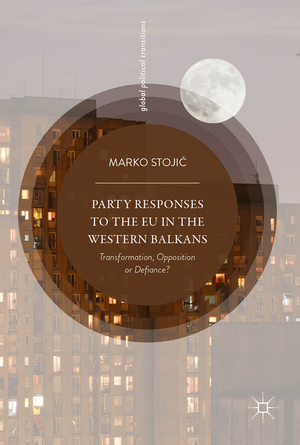Party Responses to the EU in the Western Balkans: Transformation, Opposition or Defiance?: Global Political Transitions
Autor Marko Stojićen Limba Engleză Hardback – 19 sep 2017
| Toate formatele și edițiile | Preț | Express |
|---|---|---|
| Paperback (1) | 582.08 lei 38-44 zile | |
| Springer International Publishing – 10 aug 2018 | 582.08 lei 38-44 zile | |
| Hardback (1) | 643.84 lei 6-8 săpt. | |
| Springer International Publishing – 19 sep 2017 | 643.84 lei 6-8 săpt. |
Preț: 643.84 lei
Preț vechi: 757.46 lei
-15% Nou
Puncte Express: 966
Preț estimativ în valută:
123.20€ • 128.63$ • 101.96£
123.20€ • 128.63$ • 101.96£
Carte tipărită la comandă
Livrare economică 05-19 aprilie
Preluare comenzi: 021 569.72.76
Specificații
ISBN-13: 9783319595627
ISBN-10: 3319595628
Pagini: 264
Ilustrații: XII, 291 p. 5 illus., 2 illus. in color.
Dimensiuni: 148 x 210 mm
Greutate: 0.51 kg
Ediția:1st ed. 2018
Editura: Springer International Publishing
Colecția Palgrave Macmillan
Seria Global Political Transitions
Locul publicării:Cham, Switzerland
ISBN-10: 3319595628
Pagini: 264
Ilustrații: XII, 291 p. 5 illus., 2 illus. in color.
Dimensiuni: 148 x 210 mm
Greutate: 0.51 kg
Ediția:1st ed. 2018
Editura: Springer International Publishing
Colecția Palgrave Macmillan
Seria Global Political Transitions
Locul publicării:Cham, Switzerland
Cuprins
Chapter 1, Introduction: Political parties and Europe.- Chapter 2. Serbia, Croatia and the EU: A difficult role for latecomers.- Chapter 3. Ideology, identity and party responses to Europe.- Chapter 4.- The logic of party competition and party responses to Europe.- Chapter 5.- Party position in the party system and their responses to Europe.- Chapter 6. Public, voters and party responses to Europe.- Chapter 7. Transnational party politics and responses to Europe: From ‘comfortable isolation’ to Europeanization.- Chapter 8.- Conclusions: Transformation, opposition or defiance in the Western Balkans?.
Recenzii
“Stojić’s book stands out because of the care and diligence with which the study has been conducted. … This is best illustrated by the dense and valuable tables found throughout the book. As straightforward as they look, they are in fact very rich and do an excellent job combining Stojić’s own findings with existing data from a broad variety of sources.” (Niké Wentholt, Südosteuropa, Iss (2), 2018)
Notă biografică
Marko Stojić is Lecturer in the Department of International Relations and European Studies at Metropolitan University in Prague, Czech Republic. He holds a PhD in Contemporary European Studies from the University of Sussex. His research interests focus on the study of European integration, political parties in the Western Balkans and party-based Euroscepticism. He has published in Czech Journal of Political Science and Perspectives on European Politics and Society.
Textul de pe ultima copertă
This book examines how European issues have played out in Serbian and Croatian party politics since 2000, in the context of significant challenges brought by European integration of the Western Balkans. It provides a comprehensive analysis of how political parties in these countries have determined and shifted their positions on the EU, by exploring the effect and interaction of party ideology and strategy, position within the party system, relations with the general public and voters as well as transnational party linkages. The author argues that the particular nature of European issues, closely related to crucial identity and statehood dilemmas in these post-conflict societies, largely determined party stances on the EU, feeding significant Eurosceptic sentiments. At the same time, a number of core parties underwent a rapid pro-EU conversion, pragmatically responding to internal and external incentives in the context of dynamic electoral competition and strong EU presence, and aimedat maximising their chances of securing executive office. The book will be of interest to advanced students and scholars in the fields of comparative politics, Western Balkan politics, and EU studies.
Caracteristici
Contributes to our knowledge on how contemporary political parties in Europe form and alter their attitudes towards the EU Provides an in-depth qualitative comparative study of Serbian and Croatian party politics and their parties’ positions on the EU Advances the theoretical scholarly debate on the factors that shape contemporary party responses to Europe














